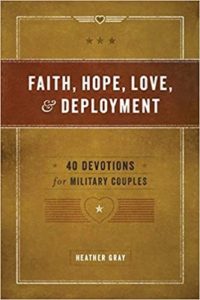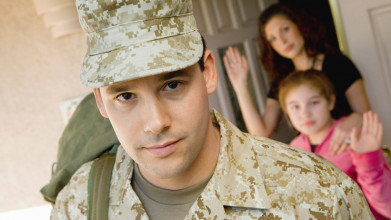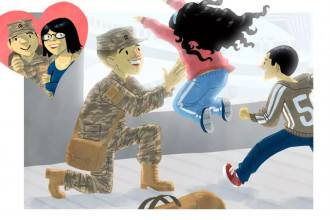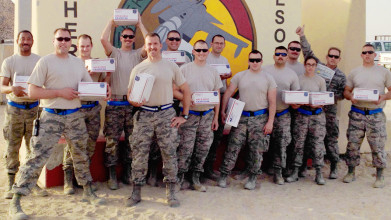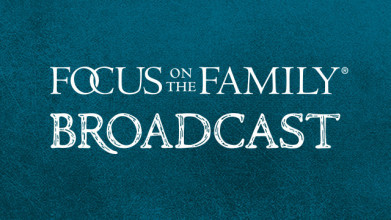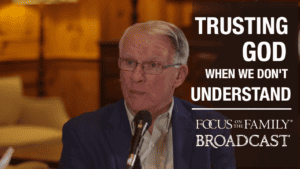Preview:
John Fuller: It’s a special Veteran’s Day edition of Focus on the Family, and today we’re taking our hats off and raising the flag in honor of those families who have sacrificed so that we can celebrate freedom. Your host is Focus President and author, Jim Daly. I’m John Fuller, and today’s program is captivating and compelling, but as we being, a note to parents that some of the content may be a little graphic at times.
End of Preview
Jim Daly: Uh John, what we want to do today is reflect for a few moments on the true price of freedom that has been paid for us so we can enjoy living in a free country, where we can express ourselves. Where we have the privilege to worship God, to vote in elections, to raise a family according to our own conscience. And to enjoy even recreational activities, and all the other things that come with living in a free country.
The generations of men and women who have committed a good portion of their life to military service are heroes in my book. And today, we honor and remember those who have given their lives so we could be free.
As the Scripture says, “Greater love has no one than this; that someone lay down his life for his friends.” That’s what so many men and women in the Armed Forces have done for us. And on this Veteran’s Day, our thanks to hundreds of thousands of military personnel who’ve endured some of the most incredible situations through various wars and battles in our nation’s even most recent history to preserve our freedom.
John Fuller: Let’s go ahead and begin this special tribute on Focus on the Family to honor those who have given so much.
Narrator: The unmistakable sounds of war. Though universally disdained by peace-loving nations, the United States has often found itself in the midst of conflict, hoping to liberate those who have never tasted the sweetness of freedom. Throughout the past century, our troops have battled tyranny and oppression around the globe, allowing others to enjoy the liberties we often take for granted.
Here in this young land we call America, our very freedoms were birthed in war. Since declaring our independence from Britain more than 200 years ago, generations of warriors have denied their selfish instincts and given their blood to defend this land. Today, we remain a free country.
But when did you last consider the price paid for your freedom? We owe a debt of gratitude to families like these.
Gerald Gray: I’m old enough that I can remember what the effect of even the Second World War was upon our family. And I can remember Keith’s father’s family getting a telegram from the War Department, stating that Addison was severely wounded. I can remember my Uncle Luther getting a telegram from the War Department, saying that his son, Elmo, was shot down over Japan – was killed. I can remember my Uncle Lawrence got a telegram, stating that Avery was killed in Belgium. They were ground fighting. I can remember both of my brothers was drafted into the Second World War Then for some reason, I got old enough that I was drafted.
And I can remember a 19-year-old farm boy that landed on a troop ship in the Pusan Harbor, South Korea. We was put on an old steam engine train with wooden boxcars. We was given live ammunition and told that we would probably need this before we got to where we was going. We rode on the train to just south of Seoul, Korea. And that’s as far as we go, because all the railroad tracks was bombed out. We was put on trucks and taken another 10 miles. I kept watching in front of us and I thought there was a severe storm because I could see lightning and I could hear the roar. And the farther we went, the brighter it got and I knew that it wasn’t the storm of what I knew.
Two o’clock in the morning we walked in to the storm that I’d watched and I remember the next day that I had time enough to start a letter home. And I remember writing in that letter that last night we walked through the gates of hell.
I can still see the faces of the 19-year-olds that wasn’t as lucky as I, that came home in pine boxes. I can still see the faces of the ones that came home not a whole body as they went with.
Narrator: In the Armed Forces, the cruel reality of war dictates that those you serve with can be ripped from your lives without mercy. The respected lieutenant or a captain. The private you sat with at breakfast just a few hours earlier. Or a Marine, like Shane Childers.
Carey Cash: As Alpha Company came across the border the night of March the 20th, within a few hours, March the 20th became March 21st, because we went across around 9 or 10 o’clock at night. And Shane, being a platoon commander, was out in there directing where his men will go, and often asking them to follow him. And that’s exactly what Shane was doing on – on the morning of March 21st.
He was leading his men in – in an assault on a gas oil separation plant. They had just about secured the area for – for the most part. All they could see were, uh, you know, burning hulks of tanks and bunkers. Most of the Iraqis had surrendered. There was some sporadic gunfire. But as he was assembling his men to get back in their armored vehicle to continue to go and reconnaissance the area, a truck load of Iraqi soldiers came barreling out of, sort of a hidden bunker. And you know, essentially just opened fire on that clustered group of marines.
But as the – as the truck went by and fired, as I said, one shot did get Shane. And uh, it hit him below his – his bulletproof flak jacket, such that within, I think, five or 10 minutes, Shane had died. And he died there with his – his platoon sergeant right at his side, with his men.
You know, Shane, a young man, who all his life wanted to be a Marine. But a young man, who as – as a young boy, saw a Marine standing guard in Iran at an embassy and said to himself, “That’s exactly what I want to be. I want to be a U.S. Marine.”
But loved his men dearly. Led them heroically. A man that, his Marines loved. In fact, many of them said, “He was really like a coach to us, because it – the way he loved us.”
He was frequently in my office just to ask advice on how he could best meet the needs of his men. You know, their marriages, their – their relationships, financial problems. And so, to lose a man like that the first day was very difficult.
Narrator: The death of a comrade is agonizing, but the heartaches of a soldier’s life aren’t limited to the tragedies on the battlefield. When he puts his gun aside at the end of the day, his thoughts may drift back to his family, where another challenge is looming. It’s at times like these that chaplains are called upon to soothe battle-weary souls on the front lines.
Chaplain Morris: You take 1100 men away from their families and stuff begins to unwind. And I had the great privilege of going from tank to tank, Bradley fighting vehicle to Bradley fighting vehicle, trench to trench and sitting with men, as they pulled out pictures of their babies and said, “Chappy, I’m missing my daughter’s birthday today.” And they begin to cry and I’d hold them. “Chappy, I got a call from my wife when I went to the MWR phone last night. She’s gonna leave me. She can’t take this military life anymore.” Who does a warrior turn to in a time like that? “Chappy, my daughter’s going to have an emergency surgery.” “Chappy, there’s not enough money to pay the bills.” Day after day, hour after hour, what a great privilege to pray with young men. To help them hold together as they sacrifice so that we can be free.
Narrator: Who are these men and women, called upon to give sacrificially of their time, of their lives, for our nation? They’re your friends and your coworkers, The kid up the street. The girl who used to cut your hair. Your uncle. Your father. Your son. Your daughter.
There are few who know today’s troops like Lieutenant Colonel Oliver North. Not only did he serve as a Marine for 22 years, but he’s also spent weeks on the front lines with today’s military. Colonel North provides a striking description of America’s young soldiers.
Lieutenant Colonel Oliver North: Average age, 19 and a half years of age. Not old enough to buy a beer. If we were back here in the States, this youngster would be wearing cut offs and Nike’s and we call him a boy, but because he’s in war, we call him a Soldier, Sailor, Airman, Marine. He had a job in high school that he used to buy a car that was on average 10 years of age. Used the car to take his high school sweetheart on dates. When he asked her to wait for him when he went off to war, she said she would but she probably won’t. He writes to her about three times a week. Actually, he writes about three letters a week. Two of those letters go to his girl, one of them goes to his mom, although he will never admit to the latter.
He’s gone weeks without bathing, but he cleans his weapon every day. He can use his own weapon like it was part of his body, and his body like it was a weapon. And he can use either or both to save a life or take one because that is his job.
Before he went in the military, this is a guy who couldn’t have been bludgeoned into clean his room or doing his laundry or, God knows, washing the dishes. But today, he is remarkably self-sufficient. He prepares his own meals, washes and mends his own clothes, digs his own foxhole and latrine, and keeps his canteens full and his feet dry.
The kid who once wouldn’t share a candy bar with his little brother today will give his last drop of water to a wounded comrade. And he’ll split his MO with a mate in a firefight because he knows they both need it. He’s a remarkable young guy. He knows that grown men don’t cry because that’s part of what we’ve been taught in our culture. But I have seen him weep unashamed over a fallen comrade. I’ve watched him hold them in their arms as they died. After one such incident, the corpsman was trying to take the body of his squad leader from a young, wounded Marine. The squad leader was dead. They take the squad leader’s body out of his arms. Young man’s corporal stands up and he looks at me and he says, “You know, Colonel, heroes aren’t just defined by how they die but by how the live.”
Roger Helle: My brother and I both volunteered to go to Vietnam and went to Vietnam the end of 1965. My first baptism of fire, my company was on a search-and-destroy mission all day long. Landed in a field, dug in, flares going off all night long. Nobody slept, the adrenaline, the anticipation.
That morning at dawn, about 5:30, we began our sweep. It was over 120 degrees that day, and we’d had about 20 casualties from heat exhaustion and heat stroke. And by 3:30, we were just totally physically exhausted, soaking wet with sweat, leeches on your arms and legs. And as we crossed that field, we were coming up to a patch of jungle. And what we did not know is we had pushed a whole enemy battalion, 650 Viet Cong regulars, into a – a peninsula. And they were dug in the tree line waiting for us. And as we crossed that field – I was an 18-year-old kid – my platoon sergeant was standing six feet away from me on my right. My best friend, Danny – I’d gone through training with – was on my left. And as we got close enough to the enemy, uh, when they opened fire, I was talking to my platoon sergeant. And as I was talking, looking at him, when they opened fire, a 50-caliber machine gun round hit him right in the top of his head. And as I threw myself down to the ground, my best friend, Danny, was hit in the chest with a 50-caliber machine gun. Killed instantly, both of them. We suffered 40 percent casualties in that one operation.
I can’t describe what it was like, as an 18-year-old kid, putting those bodies in those burial bags. I remember walking over to Danny – Danny, laying in the grass knee-high – and he was just laying there, looking up into the sky and those empty eyes. And – and I remember carrying his body. We put it in a burial bag. And I remember picking it up myself and carrying it to the chopper. But because the chopper is such a – a target, you know, they have to get in and get out. And because there were so many bodies, as – as I laid his body in the door of the chopper, the men in the chopper, all they could do is grab these nameless bags and throw them in the back to make room for more bodies. And not all the months of training prepared me for that moment. It was like something died inside of me.
John: This is a very special Veteran’s Day tribute to our nation’s Armed Forces and the families that support those men and women in the service. And uh, that very sobering story reminds us of both the harsh realities of war and the great sacrifice, as well, that men and women have made in service to their country.
To help encourage military couples, we’re offering a devotional book written by a former broadcast guest. It’s designed to encourage you. Uh, it’s called Faith, Hope, Love, and Deployment: 40 Devotions for Military Couples. You can find details and request your copy when you give us a call 1-800, the letter A, and the word FAMILY. Or at focusonthefamily.com/broadcast.
As we continue, we’re reminded that these 21st century troops stand on the soldiers of what’s been called the Greatest Generation. H. C. Kaiser who served in World War II is a great example of bravery and God’s grace during that era of American’s history.
Newsman: The last 18 hours has brought the greatest air attacks of all time against Germany. Thousands of Allied heavy bombers attacked military targets in the Cologne area within 40 miles of the battleground at Aachen, where American ground troops continue to make some progress.
H.C. Kiser: I’ll never forget that morning. It was on October the 12th, 1944. We had just gotten over the target and released the last of our 500-pound bombs. This huge B-17 bomber sustained a direct hit under the belly of the bomber. When this shell exploded, I was sitting. I had a piece of armor plating to my back and I had my legs crossed. And a huge hole about the size of a grapefruit went right between my legs and on the right side of my leg, there was about three holes the side of a baseball. And they were holes that went through the top – to the top of the plane.
And my face was filled with – with splinters from the catwalk and pieces of metal from the body of the plane. And it just engulfed my face and I said, “Oh, Lord, I’m blind.” And I shook my head, shook it off. And there I was. I was completely not a scratch, not anything the matter with my eyes.
And then, all of a sudden, it went into a spiral, a deep dive downwards. We were pinned with centrifugal force. My back went up against the top of the bomber and my arms and my legs were dangling down and I couldn’t get to my escape hatch. You see, at 29,000 feet, it was about minus 50 below zero and we had an electric heat-lined suit.
Also, we were on oxygen and the first thing that happened, we realized that our oxygen was gone and we began to gasp for breath, knowing at 29,000 feet, just a few minutes, few seconds or may be a few minutes, it’s death or else we’ll pass out. We began to pray and ask God to help us make a right decision before we – before we bailed out. The first prayer was answered. The big bomber went out of that steep dive and it leveled off a little like this.
I fell on my hands and knees, back to the belly of the plane and I crawled up to my right about eight or 10 feet to my escape hatch. See, when I pull this fleece-lined glove off and I grabbed this metal object to release it, my hand froze immediately and I didn’t have the strength to release my hand. And I asked Doug Johnson, I said, “Doug, help, I’m in trouble.” And Doug came and he put his hand over mine and together, we gave it a jerk and the big door flew open in space.
Neither had ever jumped and we were terribly frightened. And I said, “Doug, this thing’s on fire; it’s gonna blow up.” Doug jumped, and Doug said, “Look at your parachute.” He said I can’t jump. You see, my – the red ripcord handle should have been right here and there was no red handle – no ripcord handle. In fact, there was no parachute. And it had exploded like in the waist of the plane.
And Doug said, “Kaiser, we’ve been friends too long. I’m gonna ride this bomber down. We – if it burns, if it blows up, I’ll die with you.” And I said, “Doug, thank you, but don’t be a fool.” When I told Doug to jump, I saw him jump. As soon as he released from the plane, I saw him pull the ripcord and his parachute opened – successfully opened.
Then I began to wad up the contents of this tangled parachute. I began to compress it just a little like this, a little at a time. I got an object, small enough that I thought I could jump out. And I prayed a little prayer and I said, “Lord, I – I don’t know what to do. I’m – looks like death is imminent. Lord, I need a word from you.” It seemed like the Lord said, “H.C., I’m the God of miracles. And in sheer faith, 29,000 feet, if you’ll jump out, I’ll show you.”
With that in mind, I leaped out. When I cleared the – the – cleared the bomber, I opened my arms like this and I turned the contents of the parachute loose. It didn’t open. It was just all tangled and I was falling faster and faster like this. And in despair, I just bowed my head and I said, “God, thousands of miles away from my pastor and my godly parents. And Lord, maybe You can’t open this parachute.” And when I told the Lord He couldn’t, He showed me that He was a God of miracles. The parachute did open, otherwise I wouldn’t be here, would I?
I looked up and a beautiful sight, the parachute had opened. And you know why I fell all that many feet before it opened? Because right up over my machine gun was an oxygen bottle that was – I’d clip it on my harness and it would sustain life for eight to 12 minutes. When the big bomber went in this dive, that bottle came loose and it was bouncing down through the waist of the plane and I couldn’t catch it. I didn’t have enough wind to chase it.
And the good Lord let me fall – free fall – all that distance, until I got down in the atmosphere, where there’s plenty of oxygen. And He just said, “Okay, I’ll do the miracle now; I’ll open it.” And I looked up and I saw that beautiful sight.
Narrator: Perhaps one of the most dramatic moments in American history occurred on the banks of Normandy. Nearly two-thirds of the brave soldiers who stormed the beach that day died. Marking the 40th anniversary of the D-Day invasion, the late President Ronald Reagan stood on the windswept shores of France and spoke of the unparalleled determination those men displayed.
President Ronald Reagan: At dawn, on the morning of the 6th of June 1944, 225 Rangers jumped off the British landing craft and ran to the bottom of these cliffs. Their mission was one of most difficult and daring of the invasion, to climb these sheer and desolate cliffs and take out the enemy guns.
The Rangers looked up and saw the enemy soldiers at the edge of the cliff shooting down at them with the machine guns and throwing grenades and the American Rangers began to climb. They shot rope ladders over the face of these cliffs and began to pull themselves up. When one Ranger fell, another would take his place. When one rope was cut, a Ranger would grab another and begin his climb again. They climbed, shot back, and held their footing. Soon, one by one, the Rangers pulled themselves over the top and in seizing the firm land at the top of these cliffs, they began to seize back the continent of Europe.
Forty summers have passed since the battle that you fought here. You were young the day you took these cliffs. Some of you were hardly more than boys with the deepest joys of life before you, yet you risked everything here. Why? Why did you do it? What impelled you to put aside the instinct for self-preservation and risk your lives to take these cliffs? What inspired all the men of the armies that met here?
We look at you and somehow, we know the answer. It was faith and belief. It was loyalty and love. It was the deep knowledge – and pray God we have not lost it – that there is a profound moral difference between the use of force for liberation and the use of force for conquest.
Something else helped the men of D-Day: their rock-hard belief that Providence would have a great hand in the events that would unfold here. That God was an ally in this great cause.
And so, the night before the invasion, when Colonel Wolverton asked his parachute troops to kneel with him in prayer, he told them, “Do not bow your heads, but look up, so you can see God and ask His blessing in what we’re about to do.” Strengthened by their courage, heartened by their value, and borne by their memory, let us continue to stand for the ideals for which they lived and died.
Duke Boswell: I would like in – in some way, for them to remember not so much what I did, but what the ones that died did. It used to bother me that I – I would think now, “Lord, why did I live through this and all these good people didn’t? Why were they killed and why wasn’t I killed? Why did You let me live?” I don’t know the reason and I probably never will. But maybe it was because He left me so that I could maybe pass the lesson on to the other people, that – that we died, trying to preserve the freedom that we have and – and to pass on the letter that – that freedom is not free. Somebody’s got to pay for it. And that’s what I’d like to pass on; to let them enjoy these freedoms, know that someone paid dearly for them and be ready to help pay for them if – if the time should ever come.
John: What a reminder we’ve heard today that freedom isn’t free. Someone has to pay a price, and that’s what we’ve heard about today. The selflessness, the sacrifices of others for us, and for future generations. What a special Veteran’s Day tribute on Focus on the Family for those who have served in the Armed Forces.
Jim Daly: John, these stories have really grabbed my heart. Uh, during World War II, many of our troops gave up to five years being away from their families. In more recent years, men and women have been asked to deploy on multiple occasions and be away from their homes. We hear from many of those families and we want you to know we’re grateful, grateful for your sacrifice and we want to be there for you. It’s our privilege to do so. Thank you to those who provide the resources for us to reach others and strengthen their marriages in times of this kind of high stress.
John Fuller: Mm-hmm.
Jim Daly: Join us in that mission to come alongside others facing challenges, including military couples. Uh, when you donate today, Focus on the Family would like to say thank you by sending you a gift that you can use in your family or give to someone you know who has served in the military. And, for a gift of any amount, we’ll send Faith, Hope, Love, and Deployment: 40 Devotions for Military Couples as our way of saying thank you.
John Fuller: It’s a terrific little devotion book and it would be a great gift to pass along to someone, as you said Jim. And right now, when you contribute to the work of Focus on the Family, your donation will be doubled.
Jim Daly: And John, that’s because of some generous Friends of Focus that they, in a fun way, want to give families hope. More families hope. And they want to do that through your support of Focus and matching that. So, if you give 25, it’ll be 50. If you give 50, it’ll be 100. It’s a great way to spur on giving so that we can simply touch more people.
John Fuller: Donate today when you call 800, the letter A, and the word FAMILY. 800-232-6459. Or stop by focusonthefamily.com/broadcast.
On behalf of Jim Daly and the entire team, Happy Veteran’s Day and thanks for listening today to Focus on the Family. Join us next time as we once again help you and your family thrive in Christ.










